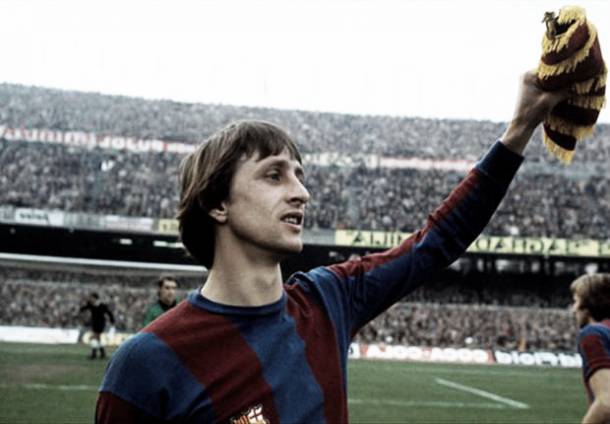FC Barcelona are one of the best-run football clubs in the modern era, and also one of the best on the pitch too. There are many men who can be attributed to this success, but one of the most prominent has to be the Dutchman Johan Cruyff, who instilled values at the Nou Camp that are still vital years, after he has left the club. Even now, after the hugely successful Guardiola era, Cruyff is remembered as one of the greats at Barcelona, and an integral part of their illustrious history.
Cruyff’s connection with Barcelona first started in 1973, when the Dutch genius joined the Catalan club after nine years at his boyhood club Ajax. The effect that Cruyff had on Dutch football was profound, and this move gave him the chance to try and have the same effect in Spain as well. He stayed at the Nou Camp for five years, and although he only brought one La Liga title to the club (along with winning the Balon D’Or in 1973 and 1974), he started to put his stamp on the club.
The attacker left Catalonia in 1978 to move to America’s soccer leagues in a lucrative deal after much of his fortune was badly invested, leaving him in financial trouble. He impressed in his two years in North America (with the Los Angeles Aztecs and then the Washington Diplomats), and earned a move back to Europe in 1981 to try his hand once again. Despite being close to a move to Leicester City (which Cruyff himself was reportedly interested in, before talks broke down) the Dutchman once again signed for a club in Spain, with Levante, then of the second division. He was, however, released after just ten appearances and a failure to win promotion for Granotes. He elected to end his career in Holland, firstly with his first club Ajax then their fierce rivals Feyenoord once his relationship with the Amsterdam club deteriorated.
After winning one last Dutch league title, Cruyff retired in 1984 after truly cementing himself as one of the playing legends of the game, in Holland and Spain. He won almost everything available to him, and can even be considered as the greatest of his era, but one of the main things that eluded him was the World Cup, which he never managed to win, despite coming close, losing in the final in both 1974 and 1978. However, Cruyff had a big effect in making the Dutch team into the relatively successful outfit we see today, with many of the members of the team being from the Ajax side that Cruyff was an important part of making.
It was clear to many that once he’d hung up his boots, the Dutch wizard was going to turn his hand to management. He was responsible for increasing the profile of Dutch football heavily, and was always quite a wise figure, although often “arrogant” at times too. It took him barely any time to get into management, as he joined his favoured club Ajax as their manager in 1985. However, his spell there as a manager was much less successful than as a player. He won just two Dutch cups in his spell, and also a European Cup Winners Cup in his final year in the hot-seat at the Amsterdam ArenA, but was unable to replicate the unprecedented he had when he was actually on the pitch.
After leaving de Amsterdammers, Cruyff jetted off back to Spain, for arguably his most successful spell as a manager, with Barcelona. Not only did he create the “Dream Team” made up of players of the calibre of Pep Guardiola and Txiki Begiristan (along with a number of foreign players such as Ronald Koeman and Michael Laudrup), but Cruyff also instilled important values in the club that have been mostly kept by the recent managers, and that are heavily important in what’s made Barcelona the fantastic club we’ve seen in recent years.
Whilst success before Cruyff became the manager at Barcelona may not have been particularly consistent, it certainly was by the time he had completed his tenure. He not only won four consecutive league titles, but also won La Blaugrana their first European Cup, with a squad captained by the superb Pep Guardiola. These successes came amongst others for Barça, and cemented Cruyff’s status as a proper legend of the game.
However, it wasn’t just the on-the-pitch successes that were precedent to the modern Barcelona that we see today. He also heavily focussed on the development of La Masia, Barça’s famed academy which has produced many of the world’s greatest talents such as Xavi, Iniesta, and Leo Messi (and those are just in the last few years). La Masia produces fantastic talents every year, and many are making it into the first-team squad, which is almost unheard of at massive clubs. This shows that La Masia is one of the most important parts of Barcelona, and shows how much of a difference it has made compared to before Cruyff was in charge and developed it.
One of the main things that young players are taught in La Masia is the attitude that allows them to play the way Barcelona do. We’re all familiar way with the style of high-pressing, possession-based football that Barcelona have reached dominance by playing over the last few seasons, and is now being copied by other teams around Europe, to some extent. However, this style of play only works because the star players are able to work together as a team, and now how each other play. This attitude is usually taught at youth level, and was emphasised by Cruyff when the manager of Barcelona.
It’s now been seventeen years since Cruyff was sacked by Barcelona’s then-chairman Josep Lluís Núñez after a trophyless final two years with the Catalan club, however many of the elements he brought into the club are still in place now, after 11 managers have been and gone at the Blaugrana. This shows just how valuable the management staff believe those values to be, and as such have reinforced them long after Cruyff had left.
Pep Guardiola, one of the integral parts of Cruyff’s reign as a manager at Barcelona, is probably the one who has been able to replicate Cruyff’s management style – and bettered it, by winning 4 more trophies than his Dutch tutor did. The “total football” style was at a peak during Guardiola’s four year tenure as he turned Barcelona into arguably the best club side of the modern era. He also made players like Lionel Messi into what they are today, but only thanks to La Masia, which owes much credit to the Dutchman Cruyff.
One thing that does worry me slightly is that on the couple of occasions that Barça have forgotten Cruyff’s values, they’ve started to falter as a club, and needed him to advise them on how to return to the heady heights once again. Unfortunately, should they start to forget again, he may not be there to save them once again. Barcelona’s current president, Sandro Rosell, when he took over in July 2010, he stripped the Dutch legend of his title as honourary president at the club, which he had received just four months earlier. The pair’s relationship seems unfixable, and whilst Rosell is still at the club, Cruyff could be reluctant to help out, resorting to indirectly writing about it in the media.
There’s no doubt that Cruyff had a profound effect on Barcelona as a club in his spells in Catalonia. Whatever successes Barcelona will have in the near future, and the trophies they’ve won since Cruyff departed as manager, are partly down to the Dutch genius, and you have to wonder just how much he means to Barcelona. In my mind, they certainly wouldn’t be where they are now without him, and may even not be a successful club, which is unimaginable considering just how good Barcelona are now. Not only was Hendrik Johannes Cruijff one of the playing greats, and one of the footballing greats, he should be able to sit back and think in his twilight years about just how big a part he played in one of the best footballing stories, FC Barcelona.










































